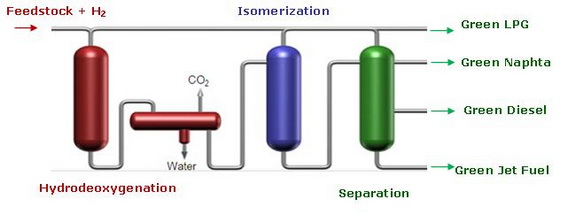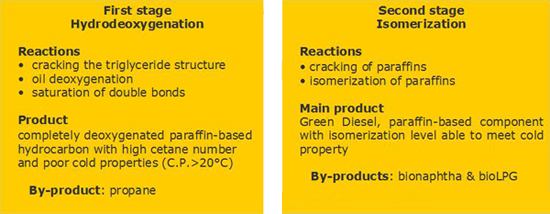6 March 2014
READ ENI GREEN REFINERY STRATEGY
READ ENI ECOFINING TECHNOLOGY AND GREEN DIESEL
DETAILS

The Green Refinery project
is the first example in the world of conversion of
a conventional refinery into a biorefinery.
At a difficult time for the European refining industry,
eni identified the opportunity to
reuse the catalytic hydrodesulfurization section in the
Venice refinery, reconfiguring it into a biorefinery.
Inside the detected configuration,
it was utilised the proprietary
EcofiningTM technology,
previously developed by eni
in the laboratories of San Donato Milanese
in partnership with Honeywell-UOP.

Following the conversion, the biorefinery will be able to
produce high-grade biofuels – in particular
* green diesel, but also
* green naphtha, LPG and potentially
* even jet fuel –
from raw materials of biological origin,
to meet the requirements of the EU Directive
on renewable energy and derive 10% of energy
in conventional fuels from renewables by 2020.
With the start up of the Green Refinery, eni will be able to
produce around 300,000 tonnes per year of
green diesel already in 2014.
The feedstock will initially be palm oil;
in the second phase, also
animal fats, used oil, oils from algae and
various types of biological waste.
strategy
The Green Refinery project aims to reconfigure
the facilities at the Venice Refinery
by identifing innovative solutions for the conversion of
the current installed operating capacity,
based on traditional production cycles,
to "green" cycles that are sustainable both
from environmental and economic perspective.
In particular, it has been developed a business model which,
through the enhancement of existing plants and
proprietary eni technologies, will make possible
the conversion of
low-cost non-conventional biological feedstock
(such as vegetable oil, biomass, etc.) into
high-value products (green diesel, green LPG,
green naphtha, etc.).
The model is particularly interesting considering
the forecasts on the rising demand for biofuels in Italy.

The process is based on
the innovative EcofiningTM technology,
developed by eni and tested in its laboratories,
which makes it possible to produce
high quality sustainable biofuels,
that overcome the limits of current FAMEs
(Fatty Acid Methyl Esters) while
reducing particulate emissions and
improving engine efficiency,
in line with current legislation and EU directives.
The raw materials of biological origin used
in the process are divided between
first generation feedstock
(vegetable oils in competition with the food chain),
second generation (animal fats, used oils and agricultural waste)
and third generation (oils from algae or waste).
EcofiningTM is also able to use
second and third generation feedstock,
anticipating possible regulation updates.
Detailed technological studies and feasibility demonstrated
that it is entirely possible to convert a traditional oil refinery
into a bio-refinery with reasonable levels of investment.
In particular, due to the its structure,
the Venice refinery is considered especially suitable
for conversion.
Technology
For the conversion of
a conventional refinery into a biorefinery.
in compliance with the current regulations while
also producing biocomponents for high grade fuels,
eni will use the proprietary
EcofiningTM technology,
developed by eni and HoneyWell-UOP,
which can produce
Green Diesel.
EcofiningTM is essentially a two-stage process:

during the first stage of hydrodeoxygenation of vegetable oil,
the oil, or more generally the biological feedswtock,
is transformed into a blend of linear C16-C18 paraffins;
in the second isomerization stage, the paraffin isomers
are transformed to give the product
the necessary cold properties and
meet the specifications of diesel fuel.
The final product, known as
HVO (Hydrotreated Vegetable Oil) or Green Diesel,
is a very high-quality diesel,
with excellent cetane levels
(cetane number1>70, similar to top quality diesel
obtained from Gas-to-Liquidsprocesses),
with high calorific value that
does not contain aromatics or heteroatoms
(sulphur, nitrogen, oxygen).
The product is also immiscible with water and
is entirely compatible with diesel produced from
petroleum (to which it can be added up to 30%),
guaranteeing that the fuel obtained respects
the strictest regulations and
has the best performance levels
for both engines and the environment.
The high calorific value of Green Diesel will allow
to reduce the consumption of
the vegetable feedstock
(initially palm oil, certified to European standards)
compared with traditional processes and to use,
in the near future, second and third generation feedstock,
as animal fats, used oil, agricultural waste,
oil from algae and other biological waste.
More information about the sustainability of
the EcofiningTM technology in Green Refinery Project.
1Cetane number: in diesel engines, the cetane number
is a measure of the reaction during ignition of fuel
(diesel and biodiesel),
expressing the fuel ignition "readiness".
The higher the cetane number,
the greater the readiness for combustion.
Benefits
The availability of the proprietary
EcofiningTM technology ensures than
eni can convert its Venice conventional refinery
into an innovative biorefinery for the production of high grade fuel
in compliance with current legislation and EU directives.
In the current European refining context, in which
nine refineries have been closed in recent years,
the Venice Refinery, which would otherwise be closed down,
will be kept in production thanks to
the Green Refinery Project that will give the plant
a new life using a new high-tech processing cycle.
The solution identified by Eni
for the conversion of existing units generates
an additional benefit in terms of lower investment cost,
compared with the construction of a new plant.
To obtain the volume of biofuel required by
the refining & marketing division portfolio,
according to the provisions of the directive on renewable energy,
the Green Refinery project will require an
investment of around €100 million,
compared with the €600 million
that would be needed for a new EcofiningTM plant.
The integration with existing plant will significantly reduce
the project’s investments costs and
provide a high level of return already
in the first years of operation.
An additional advantage will be
a substantial reduction in emissions
from the industrial plant at the Venice facility,
with beneficial effects for the environment.
In particular, when fully operational, there will be:
* a reduction of more than 45% wt in the emissions of NOx;
* a fall of 65% wt of SOx emissions,
that can also be reduced to zero
with the recovery of the H2S produced and
its recycling in the reaction section;
* a reduction of 32% wt in the emissions of particulate.
Green Fleet

the Italian Navy offshore patrol vessel Foscari,
which became the first ship of the Flotta Verde (Green Fleet).
The test represents the final phase of a research project,
called Flotta Verde (Green Fleet),
between the Italian Navy,
the Naval Armaments General Directorate and
the Research and Technological Development unit of
eni's Refining & Marketing Division.

The project was born to find an alternative product
(specifically a biofuel composed by at least 50% Green Diesel)
to the marine fossil fuel used by the Navy ships.
Thanks to the commitment and cooperation between
the Navy's naval engineers and eni's chemical engineers,
the Green Diesel was produced through
the EcofiningTM technology,
developed by Eni in partnership with Honeywell-UOP.
The initial phase of development for
the fuel optimal formulation was conducted
through a series of laboratory and engine bench test,
using the facilities of the eni's research center in
San Donato Milanese;
later the most suitable formulation
was found and tested at the emission testing facilities.
For the Navy high percentage (more than 50%) of Green Diesel
in the biofuel, the experiment was an excellent result.
The Italian Navy is at the forefront in Europe as
the first navy operationally testing Green Diesel,
anticipating the European deadline,
which includes the use of 10% organic fraction by 2020.
According to the Navy official statement, the transition from
one fuel to another did not change performance and
thermodynamic parameters of the propulsion motors;
also CO2 and pollutant emissions were
reduced in line with expectations.
Production of Green Diesel will start in eni's Venice biorefinery
from spring 2014.
WWW.CHEMWINFO.COM BY KHUN PHICHAI














